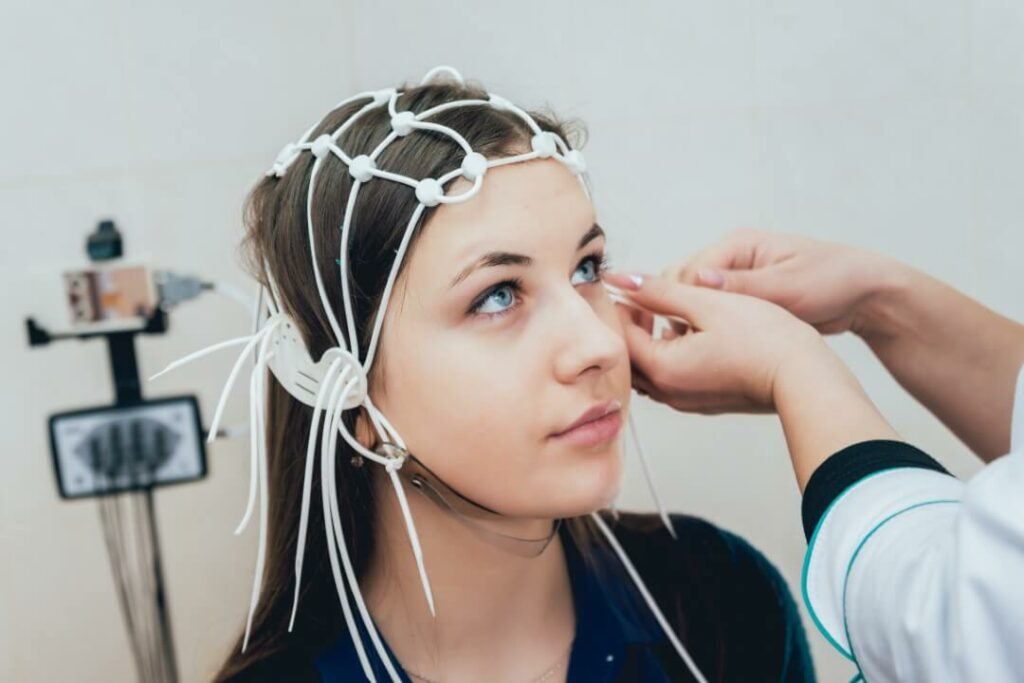Brain Mapping Therapy
Substance abuse can alter the way that the brain sends and receives information. The Summit Wellness Group utilizes brain mapping therapy to help correct the normal function of these vital neural pathways.

In this article
Our Treatment Approach
What is Brain Mapping?
In order for the brain and body to communicate, messages are sent via neurons. Electrodes placed on the skull can track these impulses and provide a picture of how they’re working. Capturing these pictures can tell us a lot about the way the brain is communicating. And through this, we can see how substance abuse has affected that communication.
Brain maps look at brain activity by analyzing different waves. Looking at those waves in each lobe can give clinicians a better idea of which treatments are needed. They can also see how substance abuse has affected the brain and work to retrain it.
Types of Brain Waves
Brain maps analyze data within the brain, and that data comes in the form of four different types of brain waves:
- Delta waves, which indicates sleep or dreams.
- Theta waves appear when the brain is in a drowsy or meditative state.
- Alpha waves or show states of relaxation.
- Beta waves show focus.
What Does This Tell Us?
Examining these waves and where they appear within the brain helps doctors locate abnormalities. Brain mapping can identify a variety of different disorders that may be the underlying cause of a person’s addiction. This provides therapists and other clinicians with a better grasp of the specific needs of their clients. Being able to identify these dual diagnosis disorders gives clients a better chance of success in their rehab plan as well. They will receive treatment for both the substance abuse and the co-occurring mental illness at the same time. These disorders include:
How Is It Used For Substance Abuse?
Along with telling us if a client is struggling with certain mental health conditions, brain mapping therapy can also be used to rewire neural pathways and train the brain to respond differently. Because substance abuse can alter the way that the brain sends and receives information, utilizing this tool as a form of therapy can help to retrain that communication.
When a client is coming through detox, their beta waves are going to be high. And brains that have been subject to addiction are only going to know that when those beta waves get too high, it’s time to take a drink or use a drug to lower them. Brain mapping therapies use natural reward systems to redirect brain waves. This lowers beta waves when they’re too high and increases alpha waves when they’re too low. And over time, as a client continues participating in this treatment and training their brain to respond, it will become easier and easier to reduce anxiety, focus, and prevent relapse.

Does Brain Mapping Really Work?
Brian mapping provides a more complete picture of each client to the treatment team. Teams are then better able to come up with the most effective and comprehensive plans possible. This procedure is non-invasive and gives therapists a picture of their client’s brain. When psychologists examine brain maps, they can depict different causes of addiction. When these causes are determined, more effective and customized treatment plans can be designed.
Who Benefits Most?
Anyone can benefit from brain mapping techniques. Individuals struggling with ADHD or early-onset dementia, however, show significant improvement in focus, attention, and remaining alert for longer periods of time. Clients struggling with ADHD may take Adderall to reduce symptoms, but once the medication wears off, brain waves are actually worse than where they began. Brain mapping, on the other hand, can significantly reduce the symptoms long-term.
There are indications that brain mapping also decreases feelings of anger and anxiety in clients. This is especially helpful when they have just detoxed and are starting their treatment program. While in early recovery, anxiety and frustration are high and all you want to do is drink or take drugs to reduce those feelings. Your brain has no idea how to deal with these situations without the drug or drink. But, if you participate in brain mapping exercises and stick with the training, your brain will be able to pull itself out of those states without drugs. Anxiety will decrease, focus will increase, and sleep will improve. These work together to heal the person as a whole and make the recovery process more successful.
Can Our Approach Help You?
While some of the clients that come to us have been diagnosed with a mental health condition in the past, some have not. Brain mapping techniques can help us pinpoint specific abnormalities within the brain. This gives us a better grasp of the underlying issues causing your addiction. Once those causes are identified, treatment plans can become more focused and pinpoint specific areas that need help.
Clients who participate in brain mapping:
- Remain in their specified treatment longer
- Are more likely to remain sober longer
- Have improvement in attention
- Show improvement in the mental health conditions they may be struggling with
- Are more cooperative in their treatment program
Our Process
Step One. Clients will fill out the initial paperwork and make a profile. They will then answer questions that help us better understand their current conditions and specific needs.
Step Two. Once clients have been approved and their account set up, they will complete an inner balance breathing exercise. Clients are hooked up to a sensor by their ear and chest. They will complete breathing exercises to measure their average coherence (when their breathing and blood oxygen levels are aligned).
Step Three. Clients will then begin their brain mapping session. A cap is placed on their head and then connected to electrodes ( non-invasive and painless). They will watch a video or movie, and the cap will track their brain waves. Each time those beta and alpha waves are in range, they will receive positive feedback. This reinforces their brain with bursts of dopamine. Whenever those waves aren’t in focus, they don’t receive positive feedback.
Step Four. Clients will continue this therapy for whatever the recommended period of time is.
Getting Help Today
Our brain mapping techniques are offered to each of our clients once enrolled in one of our treatment programs. Though it is not required, it may locate the missing link as to why someone has become addicted to drugs or alcohol. If you are struggling, give us a call today to learn about our top-rated rehab centers in Georgia.
We’re Here To Help
Get help now
We’d love the opportunity to help you during this overwhelming and difficult process. Our sincere passion is helping people recover so that they can live full, meaningful, and healthy lives.
Call us 24/7 at 770-299-1677 or fill out our contact form and a member of our admissions team will contact you shortly.


